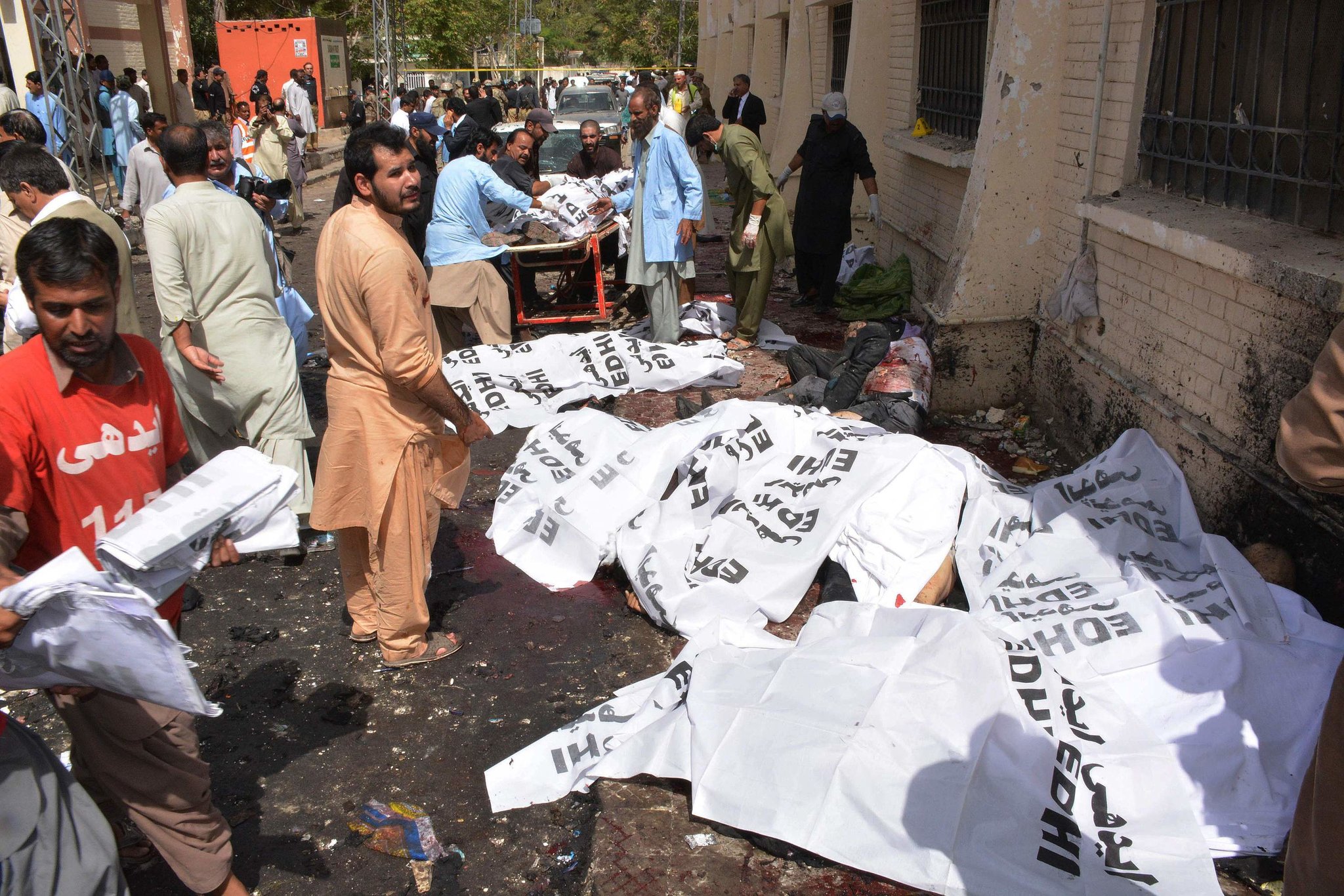


The Quetta Railway Station in Pakistan was hit by a suspected suicide bombing, killing 24 people and injuring over 50 others. The blast occurred when passengers were gathering for the departure of a train to Peshawar, with a high number of people present at the station. Balochistan Chief Minister Sarfaraz Bugti ordered an immediate inquiry and investigation into the tragic incident, stating that terrorists are increasingly targeting innocent civilians in the province. This attack adds to the ongoing threat of unrest and chaos in Balochistan, which has been hit by a series of deadly blasts in recent months.
Quetta Railway Station Bombing: A Tragedy Unveiled
On October 9, 2023, the Quetta Railway Station in Balochistan, Pakistan, was rocked by a devastating suspected suicide bombing. The tragic incident claimed the lives of 24 individuals and left over 50 others injured. The blast occurred at a crowded railway platform as passengers were waiting for a train to Peshawar.
Background of the Conflict
Balochistan has been plagued by ongoing unrest and violence for several years. The province has witnessed numerous terrorist attacks targeting security forces, government officials, and civilians. Separatist militant groups have been fighting for greater autonomy or independence for Balochistan.
Details of the Attack
According to initial reports, the explosion occurred when a suicide bomber detonated an explosive device near the platform. The impact of the blast caused significant damage to the platform and nearby areas. Witnesses described scenes of chaos and panic as the station was engulfed in smoke and debris.
Response and Investigation
Balochistan Chief Minister Sarfaraz Bugti condemned the attack and ordered an immediate inquiry and investigation. Security forces cordoned off the area and launched a search operation for possible suspects. Several arrests have been made in connection with the bombing.
Top 5 FAQs and Answers
1. What is the motive behind the attack?
The motive for the attack is still unclear. However, authorities believe that it was carried out by a terrorist group with the aim of causing mass casualties and instilling fear among civilians.
2. What is the situation in Balochistan after the attack?
The attack has heightened tensions in Balochistan and raised concerns about the ongoing security challenges. The province remains on high alert, with additional security measures being implemented.
3. What are the challenges in addressing the issue of terrorism in Balochistan?
Addressing terrorism in Balochistan is a complex issue due to the presence of multiple militant groups and the mountainous and sparsely populated terrain of the province. The government faces challenges in combating terrorism while also respecting human rights and maintaining stability.
4. What is the history of violence in Quetta Railway Station?
Quetta Railway Station has been targeted in the past. A similar bombing in 2003 claimed the lives of 58 people. The station has remained a vulnerable target due to its high foot traffic.
5. What is being done to prevent future attacks?
Security forces are increasing their presence in and around the railway station. They are deploying additional personnel, sniffer dogs, and surveillance cameras to deter and detect potential threats.

US President Donald Trump has expressed concern over the tone of incoming New York City Mayor-elect Zohran Mamdani's victory speech, calling it "angry" and advising him to adopt a more cooperative approach. In response, Mamdani has urged Trump to "turn the volume up" and vowed to hold "bad landlords" accountable, citing Trump as an example. Trump has hinted at offering limited federal help to New York under Mamdani's leadership, but has also expressed doubt towards the mayor-elect's left-leaning policies. This clash between the two leaders marks a tense beginning to their relationship.

Chief Election Commissioner Gyanesh Kumar flagged off 14 participants from 7 countries as part of the International Election Visitors’ Programme 2025 to witness voting in the Phase-I of the Bihar Assembly Elections. The participants attended an inaugural session and were provided with a demonstration of the EVMs and a presentation on various aspects of elections in India. The participants will then embark on a two-day tour of Bihar to visit EVM dispatch centers and witness the actual polling on November 6. Since 2014, the IEVP has been showcasing the strengths of India's electoral system and sharing best practices with international election management bodies. The first phase of the Bihar Assembly elections, featuring 121 constituencies and over 3 crore voters, will be held on November 6.

The recent police raid in Brazil, which resulted in one of the deadliest operations in Rio's history, has sparked outrage and protests. Families of the victims claimed that their loved ones were executed by the police, while the government celebrates it as a win against crime. Shocking images of bodies lined up in the street have led to widespread protests and accusations of police brutality. However, official reports and videos of victims' bodies suggest that the deaths were not a result of armed conflict, raising questions about the excessive use of force by the police.

Four people have died and 11 have been injured after a UPS cargo plane crashed near Louisville Muhammad Ali International Airport in Kentucky. All flights in and out of the airport have been suspended as police and emergency services are attending the scene. Kentucky governor Andy Beshear has described the accident as "catastrophic" and is urging residents to obey any shelter-in-place orders.

Eight people have been killed and numerous others injured after a passenger train collided with a goods train in Chhattisgarh. The accident occurred in the afternoon, halting train services on the route and prompting the cancellation or diversion of multiple trains. Emergency teams have been dispatched to the scene, with rescue operations ongoing and medical treatment being provided to the injured passengers. Helpline numbers have been issued for convenience, and the railway authorities have assured that all efforts are being made to assist those affected by the tragedy.

Today, 5 November 2025, marks the 556th birth anniversary of Guru Nanak Dev Ji, the founder of Sikhism. As we celebrate this sacred and highly revered festival, let us remember and spread the teachings of Guru Nanak Dev Ji, which promote compassion, humility, and love for all. To commemorate this occasion, indianexpress.com has compiled heartfelt wishes and messages to share with friends and family, wishing everyone endless happiness, peace, and prosperity.

During the Emerging Science Technology and Innovation Conclave, PM Modi announced the launch of the Rs 1 lakh crore Research, Development and Innovation Fund. This fund, under the Department of Science and Technology, aims to encourage private sector investments in R&D to drive India's vision of becoming an innovation-driven nation. With this fund, India's R&D expenditure has doubled in the last decade and the country now has the world's third-largest startup ecosystem. PM Modi also highlighted how India's domestic capability has accelerated during the COVID-19 pandemic due to its successful digital public infrastructure.

A stampede at the Kasibugga Venkateswara Swamy Temple in Andhra Pradesh has left 10 dead and two injured. The temple had recently reopened and was experiencing high footfall due to a festival. Home Minister Vangalapudi Anitha has ordered a thorough investigation into the causes of the tragedy and has promised strict measures to prevent similar incidents in the future.

India and the United States have strengthened their already strong ties by signing a 10-year framework for their major defense partnership. The agreement, signed during a bilateral meeting between the two countries' defense ministers, emphasizes the importance of this partnership in maintaining a free and open Indo-Pacific region. This marks a significant step in solidifying the bond between India and the US in the defense sector.

In preparation for a major tri-service military drill, India has issued Notices to Airmen (NOTAM) for the entire northeastern region that borders China, Bhutan, Myanmar, and Bangladesh. The first set of exercises will commence in November and continue through January, signaling enhanced operational readiness for the Indian Air Force (IAF). This move is significant as the Northeast remains a sensitive theater, making up the boundary with four countries, including China. The upcoming IAF exercises aim to strengthen India's air dominance, effectively preparing for any potential challenges along the western frontier with Pakistan.